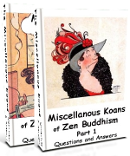9 A Buddha before History
before history, didn't realize the truth,
Seijo 'Because he did not.'

Do something: get up, dress, work.
An explanation of the Koan answer
One of the basic beliefs in Zen: There is no reason or understanding. Reasoning leads you nowhere. Everything is as it is. To question the enlightenment of an ancient Buddha is just nonsense. Don't think and ponder about legends.
Just do your daily things.
What next?
One of the basic beliefs in Zen: There is no reason or understanding. Reasoning leads you nowhere. Everything is as it is. To question the enlightenment of an ancient Buddha is just nonsense. Don't think and ponder about legends.
Just do your daily things.
What next?
The background story of this Koan
In Buddhism there's a belief in a long chain of different Buddhas who lived in different times of universal history. Shakjamuni Buddha was therefore only one of many Buddhas. The Koan refers to Daitsu Chisho, who was seen as an extremely wise Buddha who penetrated the wisdom of the universe. The Chinese version of the Koan tells a bit about Daitsu Chisho.
This background may explains the monks surprise about Seijos answers.
A monk asked Seijo: "I understand that a Buddha who lived before recorded history sat in meditation for ten cycles of existence and could not realize the highest truth, and so could not become fully emancipated. Why was this so?"
Seijo replied: "Your question is self-explanatory."
The monk asked: "Since the Buddha was meditating, why could he not fulfil Buddha-hood?"
Seijo said: "He was not a Buddha."
What next?
In Buddhism there's a belief in a long chain of different Buddhas who lived in different times of universal history. Shakjamuni Buddha was therefore only one of many Buddhas. The Koan refers to Daitsu Chisho, who was seen as an extremely wise Buddha who penetrated the wisdom of the universe. The Chinese version of the Koan tells a bit about Daitsu Chisho.
This background may explains the monks surprise about Seijos answers.
A monk asked Seijo: "I understand that a Buddha who lived before recorded history sat in meditation for ten cycles of existence and could not realize the highest truth, and so could not become fully emancipated. Why was this so?"
Seijo replied: "Your question is self-explanatory."
The monk asked: "Since the Buddha was meditating, why could he not fulfil Buddha-hood?"
Seijo said: "He was not a Buddha."
What next?
Free ebooks!
Zen Riddle #30-melting :
Why is a Buddha of metal melting when he passes through furnace?
Here's the answer....(Show/Hide)
Want more riddles? Choose one!
#10-birds #53-equal #28-leg mumonkan
Zen Riddle #30-melting :
Why is a Buddha of metal melting when he passes through furnace?
Here's the answer....(Show/Hide)
Want more riddles? Choose one!
#10-birds #53-equal #28-leg mumonkan
The original Chinese Goang
Venerable Xingyang Rang:
Because a monk asked, "Great-penetration Wisdom-winning (Daitōng Zhishèng) Buddha sat for ten aeons (kalpas) at a site of the Way yet did not manifest the Buddha Dharma and was not able to accomplish the Buddha Way.
What was he practicing in that time?"
Rang said, "That question is very attentive and appropriate."
The monk said, "Since he indeed sat very much at a site of the Way, why was he not able to accomplish the Buddha Way?"
Rang said, "He did not accomplish Buddhahood."
What next?
Traditional Commentaries and .... Poems (Gata)
Mumon's comment: I will allow his realization, but I will not admit his understanding. When one ignorant attains realization he is a saint. When a saint begins to understand he is ignorant.
Wumen says: Just so is the old barbarian’s knowledge, not so is the old barbarian’s comprehension. If an ordinary man knows he is already is a sage; if a sage comprehends he is already an ordinary man.
What next?
The Gata
It is better to realize mind than body.
When mind is realized one need not worry about body.
When mind and body become one
The man is free. Then he desires no praising.
How does knowing the body resemble knowing the joy of the heart-mind?
Being able to know the heart-mind – body not worried;
Also if body and mind are both completely known,
Why should one still hope to become a holy immortal?
What next?



